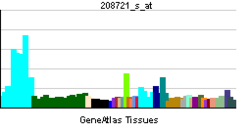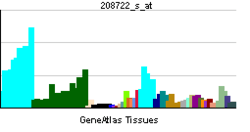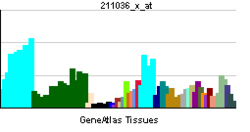ANAPC5
| View/Edit Human | View/Edit Mouse |
Anaphase-promoting complex subunit 5 is an enzyme that in humans is encoded by the ANAPC5 gene.[3][4]
The anaphase-promoting complex (APC) consists of at least 8 protein subunits, including APC5, CDC27 (APC3; MIM 116946), CDC16 (APC6; MIM 603461), and CDC23 (APC8; MIM 603462).[supplied by OMIM][4]
Interactions
ANAPC5 has been shown to interact with ANAPC1,[5][6] ANAPC4,[5] CDC27[5][7][8] and PABPC1.[7]
References
- ↑ "Human PubMed Reference:".
- ↑ "Mouse PubMed Reference:".
- ↑ Yu H, Peters JM, King RW, Page AM, Hieter P, Kirschner MW (March 1998). "Identification of a cullin homology region in a subunit of the anaphase-promoting complex". Science. 279 (5354): 1219–22. doi:10.1126/science.279.5354.1219. PMID 9469815.
- 1 2 "Entrez Gene: ANAPC5 anaphase promoting complex subunit 5".
- 1 2 3 Vodermaier, Hartmut C; Gieffers, Christian; Maurer-Stroh, Sebastian; Eisenhaber, Frank; Peters, Jan-Michael (September 2003). "TPR subunits of the anaphase-promoting complex mediate binding to the activator protein CDH1". Curr. Biol. England. 13 (17): 1459–68. doi:10.1016/S0960-9822(03)00581-5. ISSN 0960-9822. PMID 12956947.
- ↑ Sumara, I; Vorlaufer E; Gieffers C; Peters B H; Peters J M (November 2000). "Characterization of Vertebrate Cohesin Complexes and Their Regulation in Prophase". J. Cell Biol. UNITED STATES. 151 (4): 749–62. doi:10.1083/jcb.151.4.749. ISSN 0021-9525. PMC 2169443
 . PMID 11076961.
. PMID 11076961. - 1 2 Koloteva-Levine, Nadejda; Pinchasi, Dalia; Pereman, Idan; Zur, Amit; Brandeis, Michael; Elroy-Stein, Orna (May 2004). "The Apc5 Subunit of the Anaphase-Promoting Complex/Cyclosome Interacts with Poly(A) Binding Protein and Represses Internal Ribosome Entry Site-Mediated Translation". Mol. Cell. Biol. United States. 24 (9): 3577–87. doi:10.1128/MCB.24.9.3577-3587.2004. ISSN 0270-7306. PMC 387753
 . PMID 15082755.
. PMID 15082755. - ↑ Gmachl, M; Gieffers C; Podtelejnikov A V; Mann M; Peters J M (August 2000). "The RING-H2 finger protein APC11 and the E2 enzyme UBC4 are sufficient to ubiquitinate substrates of the anaphase-promoting complex". Proc. Natl. Acad. Sci. U.S.A. UNITED STATES. 97 (16): 8973–8. doi:10.1073/pnas.97.16.8973. ISSN 0027-8424. PMC 16806
 . PMID 10922056.
. PMID 10922056.
Further reading
- Grossberger R, Gieffers C, Zachariae W, et al. (1999). "Characterization of the DOC1/APC10 subunit of the yeast and the human anaphase-promoting complex". J. Biol. Chem. 274 (20): 14500–7. doi:10.1074/jbc.274.20.14500. PMID 10318877.
- Gieffers C, Peters BH, Kramer ER, et al. (1999). "Expression of the CDH1-associated form of the anaphase-promoting complex in postmitotic neurons". Proc. Natl. Acad. Sci. U.S.A. 96 (20): 11317–22. doi:10.1073/pnas.96.20.11317. PMC 18031
 . PMID 10500174.
. PMID 10500174. - Gmachl M, Gieffers C, Podtelejnikov AV, et al. (2000). "The RING-H2 finger protein APC11 and the E2 enzyme UBC4 are sufficient to ubiquitinate substrates of the anaphase-promoting complex". Proc. Natl. Acad. Sci. U.S.A. 97 (16): 8973–8. doi:10.1073/pnas.97.16.8973. PMC 16806
 . PMID 10922056.
. PMID 10922056. - Strausberg RL, Feingold EA, Grouse LH, et al. (2003). "Generation and initial analysis of more than 15,000 full-length human and mouse cDNA sequences". Proc. Natl. Acad. Sci. U.S.A. 99 (26): 16899–903. doi:10.1073/pnas.242603899. PMC 139241
 . PMID 12477932.
. PMID 12477932. - Vodermaier HC, Gieffers C, Maurer-Stroh S, et al. (2004). "TPR subunits of the anaphase-promoting complex mediate binding to the activator protein CDH1". Curr. Biol. 13 (17): 1459–68. doi:10.1016/S0960-9822(03)00581-5. PMID 12956947.
- Kraft C, Herzog F, Gieffers C, et al. (2004). "Mitotic regulation of the human anaphase-promoting complex by phosphorylation". EMBO J. 22 (24): 6598–609. doi:10.1093/emboj/cdg627. PMC 291822
 . PMID 14657031.
. PMID 14657031. - Ota T, Suzuki Y, Nishikawa T, et al. (2004). "Complete sequencing and characterization of 21,243 full-length human cDNAs". Nat. Genet. 36 (1): 40–5. doi:10.1038/ng1285. PMID 14702039.
- Koloteva-Levine N, Pinchasi D, Pereman I, et al. (2004). "The Apc5 Subunit of the Anaphase-Promoting Complex/Cyclosome Interacts with Poly(A) Binding Protein and Represses Internal Ribosome Entry Site-Mediated Translation". Mol. Cell. Biol. 24 (9): 3577–87. doi:10.1128/MCB.24.9.3577-3587.2004. PMC 387753
 . PMID 15082755.
. PMID 15082755. - Beausoleil SA, Jedrychowski M, Schwartz D, et al. (2004). "Large-scale characterization of HeLa cell nuclear phosphoproteins". Proc. Natl. Acad. Sci. U.S.A. 101 (33): 12130–5. doi:10.1073/pnas.0404720101. PMC 514446
 . PMID 15302935.
. PMID 15302935. - Gerhard DS, Wagner L, Feingold EA, et al. (2004). "The Status, Quality, and Expansion of the NIH Full-Length cDNA Project: The Mammalian Gene Collection (MGC)". Genome Res. 14 (10B): 2121–7. doi:10.1101/gr.2596504. PMC 528928
 . PMID 15489334.
. PMID 15489334. - Barrios-Rodiles M, Brown KR, Ozdamar B, et al. (2005). "High-throughput mapping of a dynamic signaling network in mammalian cells". Science. 307 (5715): 1621–5. doi:10.1126/science.1105776. PMID 15761153.
- Rual JF, Venkatesan K, Hao T, et al. (2005). "Towards a proteome-scale map of the human protein-protein interaction network". Nature. 437 (7062): 1173–8. doi:10.1038/nature04209. PMID 16189514.
- Turnell AS, Stewart GS, Grand RJ, et al. (2005). "The APC/C and CBP/p300 cooperate to regulate transcription and cell-cycle progression". Nature. 438 (7068): 690–5. doi:10.1038/nature04151. PMID 16319895.
This article is issued from Wikipedia - version of the 6/6/2016. The text is available under the Creative Commons Attribution/Share Alike but additional terms may apply for the media files.


